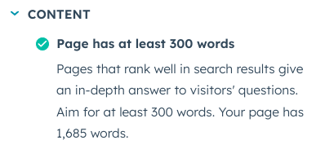Elevate your content with HubSpot Marketing Hub for content marketing. Discover how our strategies and HubSpot's tools drive success.
Ideal Blog Post Length: How Long Should Your Posts Be?
A question that seems to be often coming up is: "So, what IS the perfect length for a blog post?" Is "it depends" an appropriate answer? Is there an ideal blog post length? Let's see what's driving the best answer for your situation.
Why Does Blog Post Length Matter?
-
The average business blog post length in 2022 was between 1,100 and 1,400 words.
-
Blog posts that are 1,500 words or longer tend to rank higher in search engines. This is because longer blog posts provide readers with more information and possible value, increasing the chances of comprehensively answering the searcher's question.
-
According to HubSpot, blog posts generating the most leads are more than 2,500 words.
-
Blog posts that are well-written and engaging are more likely to be shared on social media. This is because people are more likely to share content that they find interesting and informative.
-
Blog posts that are regularly updated tend to attract more traffic. Search engines and social media algorithms favor websites that constantly publish new content.
-
Blog posts relevant to your target audience will likely be read and shared. When you write blog posts relevant to your target audience, you're more likely to capture their attention and keep them engaged.
Long-form blog posts can be more effective than short blog posts. However, the ideal blog post length will vary depending on your niche, audience, and objectives.
Unpacking the question
What are you writing about? Why? Do you want to be seen as "authoritative" and rank well on Google? Are you more interested in getting people to share your piece on social media? Are you writing a scholarly tome or doing more of a recipe-sharing or newsletter kind of thing? Where does SEO rank on your scale of importance? Who is your buyer persona? Would they rather read or watch a video?
Because the answer to "What is the ideal length of a blog post?" will differ for each of those scenarios:
-
For Google to view your site as an authority, you want to make the pieces longer, even exceeding 2,000+ words for ranking purposes. Not just words but quality, meaningful, and significant content.
-
For social media shares, the ideal range is 600-1,200 words.
-
Posts you're looking to start a conversation, keep it to under 500.
And if you're new to blogging, you may want to try various lengths to see which ones attract more readers—alternate 2,500-word content bombs with some catchy little 350-word comment magnets. Then, as your readership grows, you can decide which way to take your site.
Common mistakes
While the list of mistakes is lengthy, we made most of them ourselves; here are some of the more common errors we're finding:
-
Write what you are excited about and are not writing for your readers, not answering their questions.
-
Picking the wrong topics, writing about topics of little interest.
-
Not getting your point across; what's the one thing you want your reader to remember about your blog post?
-
Poor execution and writing, unsuitable tone of voice, typos, punctuation, poor formatting.
-
Not understanding E-E-A-T
-
If ranking in Search is your objective (it should be): not understanding SEO, internal and external linking, and topic cluster approach.
What experts have to say.
-
Hubspot research reports that the ideal post length is ~2,100 words. They say that that number will, of course, vary by topic and intent. FWIW, HubSpot operates a blog with more than 8M visitors per month.
-
Medium, on the other hand, determined that time-to-read is a more valuable metric, and on their platform, that means 7 minutes is ideal for keeping engagement high. (Spoiler alert--that post has about 1,400 words but a LOT of charts - content isn't just words.)
- Ahrefs quotes Google, saying, "As long as it takes to answer the question."
You Might Also Like This Post:
Correlation and causation are NOT the same. In other words, just because the #1 post has 2,367 words doesn't mean it's #1 BECAUSE it has 2,367 words. That may be how many words they used to write the best post in the world on widgets.
These data points, derived from experience in various fields, can render useful information in our quest to find the right blog post length. A blog post about Einstein developing the theory of relativity should be longer than the one covering the "Seven criteria for deciding what ice cream to order."
We think that SEO likes longer posts, readers like things succinct, and it's important to know your goals before getting started.
It's not you who matters in this.
It's not about what matters to you (or us). What matters is the impact on your readers:
-
Pick a representative number of your best-ranking blog posts (suggesting that you've done your optimization and they are relevant); capture post titles, search rank, and word count in a spreadsheet.
-
Capture the ranking keywords for the above posts and add them to the sheet.
-
Open the first SERP (Search Engine Results Page) worth of links—paying attention to blog posts in particular.
-
Do a quick word count on the posts that seem the most relevant to YOU, then rank them by which came up higher on the SERP.
-
Et voilà! To get you going, you have your version of the "the ideal post length is…" spreadsheet.
- For a quick tool to check a web page's word count, you might want to consider the Ahrefs SEO Toolbar, a free Chrome extension.
Before we wrap it up - here come blog headlines.
We wouldn't be doing our due diligence if we didn't touch on the critical subject of blog headlines. Yes, headlines have an ideal length, too. We covered it here, so this is the short version (see what we did there?)
Blog titles should be approximately 60 characters, no more than 70. This is primarily because that's the number of characters before Google truncates the headline on SERPs. So keep it brief if you want to be visible (which you do because it's how you draw readers through to your page, right?).
Here's a fun statistic for you: 60% of readers admit to reading the headline only. So you want to pack as much into those 60 characters as possible to entice them to read on.
OK...so what is the ideal blog post length?
<humor>1,504 words (=this blog post)</humor>. As long as they're good words. 😉

Leave your numbers and input in the comments. And don't optimize for perfect blog post length. Optimize to give the best possible answer to humans having the question.
Want to learn more?
This content is also available in:
- German: Ideale Blogpost-Länge: Wie lang sollten Ihre Beiträge sein?
- Spanish: Extensión ideal de las entradas de blog: ¿cuánto deben durar?
- French: Article de blog idéal : quelle longueur viser ?
- Italian: Lunghezza Ideale per un Post sul Blog: Guida Completa
- Romanian: Lungimea ideală a unui blog: Cât de lung ar trebui să fie?
- Chinese: 理想的博文长度:博文应该有多长?









Leave a Comment